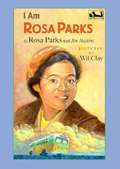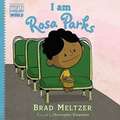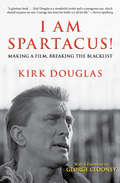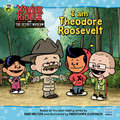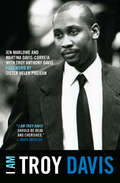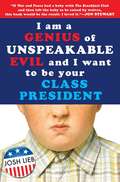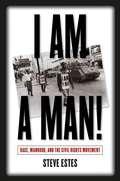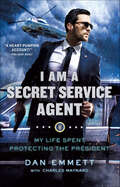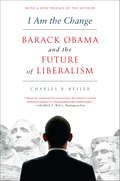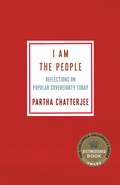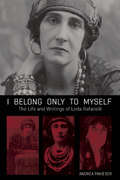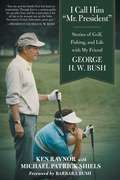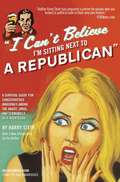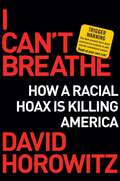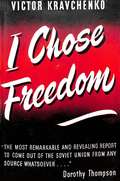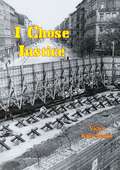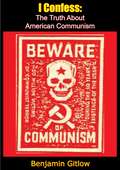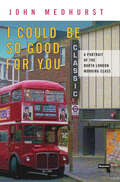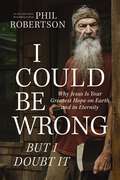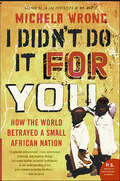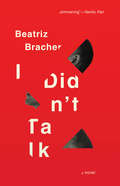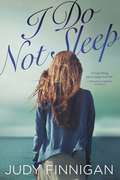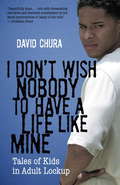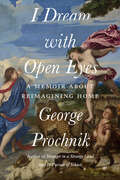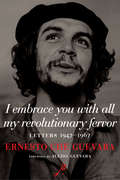- Table View
- List View
I Am Rosa Parks
by Rosa ParksThe black woman whose acts of civil disobedience led to the 1956 Supreme Court order to desegregate buses in Montgomery, Alabama, explains what she did and why.
I Am Rosa Parks (Ordinary People Change the World)
by Brad Meltzer Christopher Eliopoulos“Kids always search for heroes, so we might as well have a say in it,” Brad Meltzer realized, and so he envisioned this friendly, fun approach to biography – for his own kids, and for yours. Each book tells the story of one of America’s icons in a vivacious, conversational way that works well for the youngest nonfiction readers, those who aren’t quite ready for the Who Was biography series. Each book focuses on a particular character trait that made that role model heroic. For example, Rosa Parks dared to stand up for herself and other African Americans by staying seated, and as a result she helped end public bus segregation and launch the country’s Civil Rights Movement.
I Am Spartacus!: Making a Film, Breaking the Blacklist
by Kirk DouglasA &“lively&” memoir by the Hollywood legend about the making of Spartacus, with a foreword by George Clooney (Los Angeles Times). One of the world&’s most iconic movie stars, Kirk Douglas has distinguished himself as a producer, philanthropist, and author of ten works of fiction and memoir. Now, more than fifty years after the release of his enduring epic Spartacus, Douglas reveals the riveting drama behind the making of the legendary gladiator film. Douglas began producing the movie in the midst of the politically charged era when Hollywood&’s moguls refused to hire anyone accused of Communist sympathies. In a risky move, Douglas chose Dalton Trumbo, a blacklisted screenwriter, to write Spartacus. Trumbo was one of the &“Unfriendly Ten,&” men who had gone to prison rather than testify before the House Un-American Activities Committee about their political affiliations. Douglas&’s source material was already a hot property, as the novel Spartacus was written by Howard Fast while he was in jail for defying HUAC. With the financial future of his young family at stake, Douglas plunged into a tumultuous production both on- and off-screen. As both producer and star of the film, he faced explosive moments with young director Stanley Kubrick, struggles with a leading lady, and negotiations with giant personalities, including Sir Laurence Olivier, Charles Laughton, Peter Ustinov, and Lew Wasserman. Writing from his heart and from his own meticulously researched archives, Kirk Douglas, at ninety-five, looks back at his audacious decisions. He made the most expensive film of its era—but more importantly, his moral courage in giving public credit to Trumbo effectively ended the notorious Hollywood blacklist. A master storyteller, Douglas paints a vivid and often humorous portrait in I Am Spartacus! The book is enhanced by newly discovered period photography of the stars and filmmakers both on and off the set.
I Am Theodore Roosevelt (Xavier Riddle and the Secret Museum)
by Brooke VitaleAn 8x8 based on an episode from the PBS KIDS animated television series Xavier Riddle and the Secret Museum starring Theodore Roosevelt.Based on the children's book series Ordinary People Change the World by New York Times bestselling author Brad Meltzer and illustrator Christopher Eliopoulos, the series will introduce kids to inspiring historical figures and the character virtues that helped them succeed. Brad does not like creepy crawly things and has marked the entire playground as a No-Go Zone! The Secret Museum sends him, Xavier, and Yadina to meet Theodore Roosevelt who helps them learn that creepy crawly things need space to live, too. This episode-based 8x8 will focus on the traits that made our heroes great--the traits that kids can aspire to in order to live heroically themselves.
I Am Troy Davis
by Jen Marlowe Troy Davis Martina Davis-CorreiaThe true story of a woman&’s fight for her brother&’s life—and her own: &“Essential for those interested in the U.S. justice system&” (Library Journal). On September 21, 2011, Troy Anthony Davis was put to death by the State of Georgia. Davis&’s execution was protested by hundreds of thousands of people across the globe, and Pope Benedict XVI, Pres. Jimmy Carter, and fifty-one members of Congress all appealed for clemency. Davis&’s older sister, Martina, a former Army flight nurse who had served in the Gulf War, was one of Davis&’s strongest advocates—despite the fact that she was battling liver and metastatic breast cancer and died just weeks after her brother&’s death by lethal injection. This book, coauthored by Martina and writer Jen Marlowe, tells the intimate story of an ordinary man caught up in an inexorable tragedy. From his childhood in racially charged Savannah; to the confused events that led to the 1989 shooting of a police officer; to Davis&’s sudden arrest, conviction, and two-decade fight to prove his innocence, I Am Troy Davis takes us inside a broken legal system where life and death hang in the balance. It is also an inspiring testament to the unbreakable bond of family and the resilience of love, and reminds us that even when you reach the end of justice, voices from across the world can rise together in chorus and proclaim, &“I am Troy Davis.&” &“Martina Correia&’s heroic fight to save her brother&’s life while battling for her own serves as a powerful testament for activists.&” —The Nation &“Should be read and cherished.&” —Maya Angelou, author and civil rights activist
I Am a Genius of Unspeakable Evil and I Want to Be Your Class President
by Josh Lieb"Family Guy" meets "Election" in this hilarious young adult debut! Twelve-year-old Oliver Watson's got the IQ of a grilled cheese sandwich. Or so everyone in Omaha thinks. In reality, Oliver's a mad evil genius on his way to world domination, and he's used his great brain to make himself the third-richest person on earth! Then Oliver's father and arch nemesis makes a crack about the upcoming middle school election, and Oliver takes it as a personal challenge. He'll run, and he'll win! Turns out, though, that overthrowing foreign dictators is actually way easier than getting kids to like you... Can this evil genius win the class presidency and keep his true identity a secret, all in time to impress his dad?
I Am a Man!
by Steve EstesThe civil rights movement was first and foremost a struggle for racial equality, but questions of gender lay deeply embedded within this struggle. Steve Estes explores key groups, leaders, and events in the movement to understand how activists used race and manhood to articulate their visions of what American society should be.Estes demonstrates that, at crucial turning points in the movement, both segregationists and civil rights activists harnessed masculinist rhetoric, tapping into implicit assumptions about race, gender, and sexuality. Estes begins with an analysis of the role of black men in World War II and then examines the segregationists, who demonized black male sexuality and galvanized white men behind the ideal of southern honor. He then explores the militant new models of manhood espoused by civil rights activists such as Malcolm X and Martin Luther King Jr., and groups such as the Nation of Islam, the Student Nonviolent Coordinating Committee, and the Black Panther Party.Reliance on masculinist organizing strategies had both positive and negative consequences, Estes concludes. Tracing these strategies from the integration of the U.S. military in the 1940s through the Million Man March in the 1990s, he shows that masculinism rallied men to action but left unchallenged many of the patriarchal assumptions that underlay American society.
I Am a Secret Service Agent: My Life Spent Protecting the President
by Charles Maynard Dan EmmettAdapted from Within Arm'’s Length for a younger audience, a rare inside look at the Secret Service from an agent who protected Presidents George H. W. Bush, Bill Clinton, and George W. Bush.Dan Emmett was just eight years old when President John F. Kennedy was assassinated. From that moment forward, he knew he wanted to become a Secret Service agent, one of an elite group of highly trained men and women dedicated to preserving the life of the President of the United States at any cost, including sacrificing their own lives if necessary. Armed with single-minded determination and a never-quit attitude, he did just that. Selected over thousands of other highly qualified applicants to become an agent, he was eventually chosen to be one of the best of the best and provided protection worldwide for Presidents George Herbert Walker Bush, William Jefferson Clinton, and George W. Bush. I Am a Secret Service Agent skillfully describes the duties and challenges of conducting presidential advances, dealing with the media, driving the President in a bullet-proof limousine, running alongside him through the streets of Washington, and flying with him on Air Force One. With fascinating anecdotes, Emmett weaves keen insight into the unique culture and history of the Secret Service with the inner workings of the White House. I Am A Secret Service Agent is a must read for young adults interested in a career in federal law enforcement.
I Am the Change: Barack Obama and the Future of Liberalism
by Charles R. KeslerIs Barack Obama the savior of liberalism—or the last liberal president? Charles R. Kesler's spirited analysis of Obama's political thought shows that he represents either a new birth of liberalism—or its demise.Who is Barack Obama? Though many of his own supporters wonder if he really believes in anything, Charles R. Kesler argues that these disappointed liberals don't appreciate the scope of the president's ambition or the long-term stakes for which he is playing.Conservatives also misunderstand Obama, according to this leading conservative scholar, educator, and journalist. They dismiss him as a socialist, hopelessly out of touch with the American mainstream. The fringe Right dwells on Obama's foreign upbringing, his missing birth certificate, Bill Ayers's supposed authorship of his books. What mainstream and fringe have in common is a stubborn underestimation of the man and the political movement he embodies.Reflecting a sophisticated mix of philosophy, psychology, and history, and complemented by a scathing wit, I Am the Change tries to understand Obama as he understands himself, based largely on his own writings, speeches, and interviews. Kesler, the rare conservative who takes Obama seriously as a political thinker, views him as a gifted and highly intelligent progressive who is attempting to become the greatest president in the history of modern liberalism. Intent on reinvigorating the liberal faith, Obama nonetheless fails to understand its fatal contradictions—a shortsightedness that may prove to be liberalism's undoing.Will Obama save liberalism and become its fourth great incarnation, following Woodrow Wilson, Franklin D. Roosevelt, and Lyndon B. Johnson? Or will he be derailed by his very successes? These are the questions at the heart of Kesler's thoughtful and illuminating book.
I Am the People: Reflections on Popular Sovereignty Today (Ruth Benedict Book Series)
by Partha ChatterjeeThe forms of liberal government that emerged after World War II are in the midst of a profound crisis. In I Am the People, Partha Chatterjee reconsiders the concept of popular sovereignty in order to explain today’s dramatic outburst of movements claiming to speak for “the people.”To uncover the roots of populism, Chatterjee traces the twentieth-century trajectory of the welfare state and neoliberal reforms. Mobilizing ideals of popular sovereignty and the emotional appeal of nationalism, anticolonial movements ushered in a world of nation-states while liberal democracies in Europe guaranteed social rights to their citizens. But as neoliberal techniques shrank the scope of government, politics gave way to technical administration by experts. Once the state could no longer claim an emotional bond with the people, the ruling bloc lost the consent of the governed. To fill the void, a proliferation of populist leaders have mobilized disaffected groups into a battle that they define as the authentic people against entrenched oligarchy.Once politics enters a spiral of competitive populism, Chatterjee cautions, there is no easy return to pristine liberalism. Only a counter-hegemonic social force that challenges global capital and facilitates the equal participation of all peoples in democratic governance can achieve significant transformation. Drawing on thinkers such as Antonio Gramsci, Michel Foucault, and Ernesto Laclau and with a particular focus on the history of populism in India, I Am the People is a sweeping, theoretically rich account of the origins of today’s tempests.
I Belong Only to Myself
by Andrea PakieserLeda Rafanelli was one of the most prolific propagandists in early twentieth-century Italy. A comrade of Benito Mussolini before he turned fascist, she converted to anarchism and Islam at the age of twenty, a combination characteristic of her iconoclastic approach to life and politics. Weaving excerpts from Rafanelli's novels, poems, and essays with extensive biographical research, this book tells the story of the insurrections accompanying the birth of the Italian nation, the evolution of the anarchist movement, struggles for alternatives to bourgeois feminism, and the dangers faced by those opposing global war and fascism.Andrea Pakieser is a writer and translator currently at the University of Paris.
I Call Him "Mr. President": Stories of Golf, Fishing, and Life with My Friend George H. W. Bush
by Barbara Bush Michael Patrick Shiels Ken RaynorA presidential tale of friendship, travel, and the great outdoors! In I Call Him “Mr. President”, Ken Raynor—head professional at Cape Arundel Golf Club in Kennebunkport, Maine for thirty-eight years—tells the story of how President George HW Bush befriended him during Bush’s annual summer sabbatical to seaside Kennebunkport, Maine. Raynor’s personal relationship with Bush led him to experience everything from fishing trips to the wilds of Newfoundland to countless outings on the golf course, including Bush’s last as commander in chief. Along the way, Raynor assisted Bush, a WWII veteran, in welcoming world leaders, former presidents, celebrities, and PGA Tour stars to the quaint Cape Arundel Golf Club and saw the excitement in their eyes during the outings. But he most cherishes his time after the rounds, in the Bush family home on nearby Walkers Point or in a tiny fishing boat, when the President would put his feet up, stare out at the Atlantic, and recount the days’ events. In this book, Raynor reflects on the life lessons he gained from a friendship born outdoors that has continued to develop over decades, during golf outings that have ranged from Maine to Augusta National to the White House putting green, international fishing trips, retreats at Camp David, flying in Marine One, and many other unforgettable experiences. Raynor has likely played more rounds with a POTUS than any PGA professional in history.
I Can't Believe I'm Sitting Next to a Republican
by Harry SteinWith biting wit and amusing personal anecdotes, Harry Stein's I Can't Believe I'm Sitting Next to a Republican chronicles the everyday travails and triumphs of the plucky conservatives marooned in the liberal bastions that loathe them, from Manhattan to Hollywood, to all the noxious places in between. Surrounded by the insufferably smug and self righteous -- from the angry old lady with the anti-war sign affixed to her walker to the random jerk at a dinner party quoting George Soros - these intrepid souls live in a hostile world; knowing that anytime a neighbor chances to learn their views on affirmative action, big government, feminism, the environment, abortion, multi-culturalism, sex education, the reliability of The New York Times, the scariness of evangelicals or (fill in the blank), his/her face will register stunned surprise and deep confusion. Or worse.Stein gives special attention to those conservatives working in professions dominated by the liberal elite--journalism, publishing, entertainment, and academia--celebrating their guts and sharing in their disdain for the dogmatism of the self-appointed creative and intellectual class. The result is a conservative's guide to love, work, friendship, dinner party mischief, and staying happy and un-smeared in liberal America.
I Can't Breathe: How a Racial Hoax Is Killing America
by David HorowitzTHE TRUTH ABOUT THE BLACK LIVES MATTER MARTYRS &“This book is essential. Don&’t miss it.&” —MARK LEVIN &“A brilliant examination of the actual facts of the George Floyd case and the subsequent exploitation of his death by Black Lives Matter.&” —LEO TERRELL, civil rights attorney & commentator In his latest salvo in the battle for America&’s survival, David Horowitz exposes the racial hoax that is spawning riots and dividing the nation. Examining the twenty-six most notorious cases of police &“racism&”— from Trayvon Martin and Michael Brown to George Floyd and Breonna Taylor—Horowitz demonstrates that Black Lives Matter has lied about every one of them in its quest to undermine law and order, fuel race hatred, and destroy America. In case after case, the lies and mythmaking break down under Horowitz&’s scrutiny. Even the chief prosecutor in the George Floyd case was forced to admit that he had no evidence of racial bias, while Breonna Taylor, the longtime accomplice of a major drug dealer, was killed when she and her boyfriend resisted arrest. The unchallenged myths about racist murders by the police have brought mayhem and crime to our cities, where the victims are predominantly black. They are also a slander against the United States, the least racist country in history, and against black Americans, the vast majority of whom are successful and law-abiding citizens. Now the Biden administration has embraced the false narrative of &“systemic racism&” and &“white supremacy,&” which supposedly infect every aspect of American life, using it to justify a witch hunt for &“domestic terrorists.&” Most Americans, black and white, know in their bones that this portrayal of their country is a lie. An unflinching and courageous accounting, I Can&’t Breathe is the urgently needed proof that they are right.
I Chose Freedom: The Personal And Political Life Of A Soviet Official
by Victor KravchenkoKravchenko's memoir, I Chose Freedom, originally published in 1946, was a best seller both in the U.S. and Europe. It contains extensive revelations on collectivization, Soviet prison camps and the use of penal labor which came at a time of growing tension between the Soviet Union and the West. Its publication was met with vocal attacks from the Soviet Union and by international Communist parties.
I Chose Justice
by Victor KravchenkoOriginally published in 1950, I Chose Justice details Soviet defector Victor Kravchenko's "trial of the century" in France.When the French Communist weekly Les Lettres Françaises launched an attack on Kravchenko's character by alleging that his 1946 memoir I Chose Freedom had been concocted by the Mensheviks & the U.S. Intelligence Service, Kravchenko filed a lawsuit for libel in a French court.The resultant lengthy trial in 1949 featured hundreds of witnesses, with the Soviet Union flying in Kravchenko's former colleagues to denounce him, accusing him of being a traitor, a draft dodger, and an embezzler. Even Kravchenko's ex-wife was summonsed to appear for the defence.Kravchenko's lawyers presented witnesses who had survived the Soviet prison camp system, including Margarete Buber-Neumann, the widow of German Communist Heinz Neumann, who had been shot during the Great Purge. As a survivor of both Soviet and Nazi concentration camps, her testimony corroborated Kravchenko's allegations concerning the essential similarities between the two dictatorships.A fascinating account.
I Confess: The Truth About American Communism (Select Bibliographies Reprint Ser.)
by Benjamin GitlowIn 1940, American socialist-turned-conservatist politician Benjamin Gitlow first published this work of political autobiography, I Confess: The Truth About American Communism. The book proved to be controversial and widely noticed, pushing Gitlow into the public eye as a leading opponent of American Communism. To this day, it remains an important primary document for the study of American Communism in the 1920s and 1930s.“This book is a faithful and, resolutely candid account from the inside—and what is more important, from the top—of a vital phase of recent American history. The history is secret, and might well have remained so but for the extraordinary poise and courage of this man, Ben Gitlow, and his ultimate recovery of clear vision and unmixed devotion to his ideals.”—Max Eastman, Introduction
I Could Be So Good For You: A Portrait of the North London Working Class
by John MedhurstI Could Be So Good For You is a unique portrait of north London's working class from the 1950s to the 21st century, and how it lived, struggled, survived and sometimes thrived. <p><p> I Could Be So Good For You tackles head-on the pernicious and implicitly racist fiction that London, most especially north London, has no "real" working class in comparison to a more "authentic" working class in a place called "the North". In doing so it offers a history and a portrait of north London's working class from the 1950s to the 21st century, based on a wide and original range of sources including personal memoirs, autobiographies, collected oral histories and new interviews conducted by the author. The result is an important social history and a rich panorama of working-class life — its struggles, work, celebrations, events, triumphs, tragedies and the occasional nice little earner. For good or ill, from the start of post-war affluence in the 1950s to the economic crash of 2008, north London's working class had a life experience like almost no other part of the British working class, one not just of poverty, racism and exploitation, but also of bold new housing schemes in the heart of the city, of great opportunity and diversity and enjoyment. Its about time to tell that story.
I Could Be Wrong, But I Doubt It: Why Jesus Is Your Greatest Hope on Earth and in Eternity
by Phil RobertsonDiscover the completely unique qualifications and accomplishments of Jesus Christ--the Creator of everything, the King who will set you free, and the best friend you could ever have.Over nearly five decades of walking with God, podcaster, author and Duck Dynasty star Phil Robertson has learned a thing or two about why Jesus is the only one worth following. Of all the things we could put our trust in, only Jesus has the answers to our questions and the solutions for our problems.Plenty of people claim to have the answers for a better life. Politicians claim they can fix our nation. Scientists and technologists trumpet the latest and greatest discoveries that'll make everything right. Self-help gurus offer one pathway to peace after another. But it's no secret that our world is increasingly divided and broken--and we've got the fear, anxiety, and hopelessness to prove it. Jesus alone can make good on the promise of lasting peace, real freedom, and life eternal.With his trademark directness, humor, and insight, Phil will help youexperience Jesus as the Creator and all-powerful Sustainer of all creation;reconcile your own brokenness and sinfulness with Jesus&’ unending well healing, forgiveness, and peace;develop the eyes to see Jesus for who he really is: the friend who will always be there for you, no matter what mistakes you've made; andlook to the Bible to get to know Jesus and better understand His grace and love for you.Politics won't save you. Science can't give you the power to sidestep death. The pleasures and joys of this world are fleeting at best, damaging counterfeits at worst. But Phil has good news for you: Jesus offers life, joy, and peace, and he's never more than a prayer away.Look for additional bold, biblical content from Phil:UncanceledJesus PoliticsTheft of America&’s SoulYour Daily Phil
I Didn't Do It for You: How the World Betrayed a Small African Nation
by Michela Wrong“Contemporary history on a grand scale . . . Wrong has given us another essential contribution to understanding the postcolonial scramble for Africa.” —John le Carré, #1 New York Times–bestselling authorScarred by decades of conflict and occupation, the craggy African nation of Eritrea has weathered the world’s longest-running guerrilla war. The dogged determination that secured victory against Ethiopia, its giant neighbor, is woven into the national psyche, the product of cynical foreign interventions. Fascist Italy wanted Eritrea as the springboard for a new, racially pure Roman empire; Britain sold off its industry for scrap; the United States needed a base for its state-of-the-art spy station; and the Soviet Union used it as a pawn in a proxy war.In I Didn’t Do It for You, Michela Wrong reveals the breathtaking abuses this tiny nation has suffered and, with a sharp eye for detail and a taste for the incongruous, tells the story of colonialism itself and how international power politics can play havoc with a country’s destiny.“Vivid, penetrating, wonderfully detailed. Michela Wrong has written the biography of a nation and more—she has excavated the very heart and soul of the Eritrean people and their country.” —Aminatta Forna, author of The Devil That Danced on Water“Engrossing, vividly written in the style of the best thrillers . . . I’ve read nothing that’s told me as much about either Eritrea or Ethiopia. It should become that standard work on the region.” —Anthony Sampson, author of Mandela: The Authorized Biography“Wrong excels as a storyteller, providing evocative descriptions of Eritrea’s dramatic topography and gripping dollops of military history.” —The Washington Post
I Didn't Talk
by Adam Morris Beatriz BracherThe English-language debut of a master stylist: a compassionate but relentless novel about the long, dark harvest of Brazil’s totalitarian rule A professor prepares to retire—Gustavo is set to move from Sao Paulo to the countryside, but it isn’t the urban violence he’s fleeing: what he fears most is the violence of his memory. But as he sorts out his papers, the ghosts arrive in full force. He was arrested in 1970 with his brother-in-law Armando: both were vicariously tortured. He was eventually released; Armando was killed. No one is certain that he didn’t turn traitor: I didn’t talk, he tells himself, yet guilt is his lifelong harvest. I Didn’t Talk pits everyone against the protagonist—especially his own brother. The torture never ends, despite his bones having healed and his teeth having been replaced. And to make matters worse, certain details from his shattered memory don’t quite add up... Beatriz Bracher depicts a life where the temperature is lower, there is no music, and much is out of view. I Didn't Talk's pariah’s-eye-view of the forgotten “small” victims powerfully bears witness to their “internal exile.” I didn’t talk, Gustavo tells himself; and as Bracher honors his endless pain, what burns this tour de force so indelibly in the reader’s mind is her intensely controlled voice.
I Do Not Sleep
by Judy FinniganFrom bestselling author, broadcaster, journalist and Book Club champion Judy Finnigan comes an unputdownable and wonderfully moving story of the enduring power of a mother's love.Do not stand at my grave and weep I am not there; I do not sleep. Five years ago, Molly Gabriel lost her 20-year-old son, Joey, to a terrible sailing accident. His empty boat was found washed ashore on the rocks -- but his body was never found. Now, Molly has returned to the sands of Cornwall haunted by his death, unable to accept he is gone. Joey was an experienced sailor and died on a calm sea -- things just don't add up and Molly cannot let it go. Desperate for answers she turns to Joey's best friend, Ben, to go back to what really happened that day . . .
I Don't Wish Nobody to Have a Life Like Mine
by David ChuraSince the early 1990s, thanks to inflamed rhetoric in the media about "superpredators" and a wave of get-tough-on-crime laws, the number of juveniles in prison has risen by 35 percent, according to the U.S. Department of Justice, and their placement in adult prison has increased by 208 percent, according to a 2007 survey by the Campaign for Youth. Since 1992, every state except Nebraska has passed laws making it easier to prosecute youth under eighteen as adults, and most states have legalized harsher sentences for juveniles. David Chura taught high school in a New York county penitentiary for ten years and saw these young people--and the effects of our laws on them--up close. Here he introduces us to the real kids behind the hysteria: vibrant, animated kids full of humor and passion; kids who were born into families broken up and beaten down by drugs, gang violence, AIDS, poverty, and abuse. He also introduces us to wardens, correctional officers, family members, and doctors, and shows how everyone in this world is a child of disappointment. We meet Wade, who carries a stack of photos of his HIV-positive mother in his pocket to take out and share with pride. Khalil has spent all fifteen years of his life in foster care, group homes, juvenile detention, and mental hospitals, yet has channeled his inner demons into poetry. There's Anna, a hard-nosed one-time teenage drug baroness who serves as a tutor to students and older women alike; Dominic, a father of two who only reads in jail, and only the Harry Potter books; and Eddyberto, a bright student and self-taught artist whose wildly creative drawings are confiscated and used to accuse him of being a potential terrorist and threat to national security. Then there's O'Shay, a big, burly, snarling Bronx-Irish classroom officer with a surprising protective side for the underdog, and Ms. Wharton, a hallway officer with a spiky demeanor but a soft spot for animals. In language that carries both the grit of the street and the expansiveness of poetry, Chura breaks down the divisions we so easily erect between us and them, the keepers and the kept--and shows how, ultimately, we as individuals and as a society have failed these young people.
I Dream with Open Eyes: A Memoir
by George ProchnikA journey of reckoning and renewal, this story of family history and future dreams is an examination of the individual imagination as a catalyst for social changeWhatever the ideological slant of our information feeds, nowadays we all share a sense of binge-watching the apocalypse. Facing so much uncertainty, we need a language for thinking about the unknown not simply as a threat but also as a space of fertile possibility. George Prochnik has chosen to reflect on these urgent themes through the lens of a personal narrative: an account of his own family&’s decision to leave the United States.I Dream with Open Eyes begins with an exploration of Prochnik&’s ancestral past: the pilgrimage of his mother&’s family, who were among the first English settlers in the New World. In the aftermath of the 2016 election, a parallel migration unfolds as Prochnik, along with his wife and their son, makes the decision to uproot their lives in New York to move to England.A deep critique of this current moment, Prochnik takes the words of nineteenth-century poet Heinrich Heine, &“I dream with open eyes, and my eyes see,&” as an inspiration to ask how, as a society, we might use art and literature to refract and expand our vision of the future, while simultaneously generating a new focus on present realities.
I Embrace You with All My Revolutionary Fervor: Letters 1947-1967
by Ernesto Che GuevaraThe first-ever edition of Che Guevara's letters, the vast majority never-before published in English in any form.Ernesto Che Guevara was a voyager—and thus a letter writer—for his entire adult life. The letters collected in I Embrace You with All My Revolutionary Fervor: Letters 1947-1967 range from letters home during his Motorcycle Diaries trip, to the long letter to Fidel after the success of the Cuban revolution in early 1959 (from which the book's title comes), from the most personal to the intensely political, revealing someone who not only thought deeply about everything he encountered, but for whom the process of social transformation was a constant companion from his youth until shortly before his death. His letters give us Che the son, the friend, the lover, the guerrilla fighter, the political leader, the philosopher, the poet. Che in these letters is often playful, funny, sometimes sarcastic, and deeply affectionate. His life was short, and these twenty years, from when he was 19 until days before his death, show it was also incredibly rich and full.As his daughter Aleida Guevara, also a doctor like her father, writes, "When you write a speech, you pay attention to the language, the punctuation and so on. But in a letter to a friend or a member of your family, you don't worry about those things. It is you speaking, in your authentic voice. That's what I like about these letters; they show who Che really was and how he thought. This is the true political testimony of my father."
